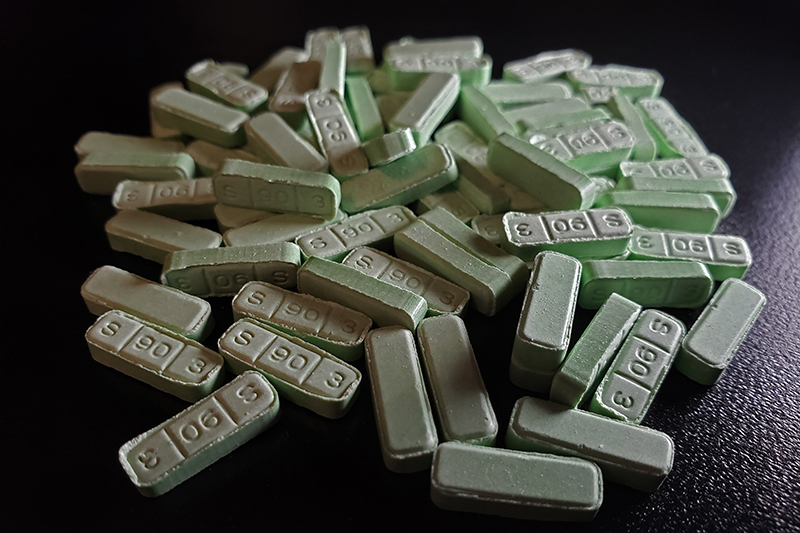As with clothing fashion, the drugs that most people are able to buy are determined by the choices of designers, manufacturers and logistical operations, rather than consumers.
As with fashion and music, illicit drugs go through peaks and troughs of popularity. There are popular staples, such as cannabis, and more disruptive and transient substances, such as mephedrone.
As with clothing fashion, the drugs that most people are able to buy are determined by the choices of designers, manufacturers and logistical operations, rather than consumers.
Predicting how the UK drug market may change in 2024 relies not only on recent trends in drug use but also on international developments. Geopolitical events in south-east Asia or South America are just as important as organised crime activity in cities such as London or Liverpool. We suggest that there are four types of drugs that will be of increasing concern in 2024.
1: Opioids
Heroin sold in the UK is primarily sourced from opium grown in Afghanistan. Any change in the production and distribution of opium has a direct effect on the UK heroin market.
After seizing power in 2022, the Taliban announced a clampdown on opium farming in Afghanistan. While other growing regions have increased production, this has not been at the level of the Afghan crop.
Large stockpiles of opium and heroin stored along trafficking routes have depleted. 2024 will see the impact of this.
The estimated number of people who use heroin has increased over the past decade, with an estimated 341,032 current users in England. This is a highly profitable market, and suppliers are adaptable and nimble in responding to changes like these.
Government and treatment services must act now to prepare for an increase in the supply of these drugs, as the costs of not doing so might lead to a ‘nightmare scenario’.
As a consequence of the shortfall in Afghan heroin production, new, highly potent synthetic opioids have already emerged to fill the gap. These include the group of synthetic opiates known as nitazenes, which have contributed to the record levels of drug-related deaths recorded in 2023 in the UK.
Increased market penetration of these drugs could lead to a big rise in deaths in 2024. Worryingly, misselling as other products and unintentional contamination of other non-opioid drugs could increase the harms further.
Government and treatment services must act now to prepare for an increase in the supply of these drugs, as the costs of not doing so might lead to a ‘nightmare scenario’.
2: Cocaine
Cocaine has never been purer, more affordable and more available to those who want it in the UK. While levels of use have been relatively stable over the past 20 years, deaths and hospitalisations have increased due the nature of the product on the market and increases in the frequency and length of use.
Unlike other class A drugs, such as heroin, there are few effective treatments, and users tend to be more socially integrated. This means that they are less likely to come into contact with police or present to treatment services.
They may not identify themselves as having a drug problem, despite the effect it may be having on their lives. When disposable income continues to be squeezed as it is in the current cost-of-living crisis, powder cocaine (as opposed to crack cocaine) is a drug that will continue to provide good “value for money”. Sadly, we predict yet another rise in poisonings and hospitalisations in 2024.
3: Ketamine
Ketamine has been used in medicine as an anaesthetic for many years, and more recently as an anti-depressant. Taken recreational at lower doses, the drug induces feelings of detachment and happiness.
This is another drug that has become increasingly popular because it is cheap, fast-acting and easy to get hold of. Around 3.8% of young people (aged 16-24) report having used the drug. This has been steadily rising over the past decade.
This is another drug that has become increasingly popular because it is cheap, fast-acting and easy to get hold of. Around 3.8% of young people (aged 16-24) report having used the drug. This has been steadily rising over the past decade.
Police report that the weight of seizures of ketamine that they made increased sharply from 187kg in 2021 to 1,837kg in 2022. Drug seizures are often used as a proxy for estimating levels of supply.
A range of problems can develop for those using ketamine in higher doses or over a longer period, ranging from mental health problems to incontinence. An overdose of the drug can prove to be fatal.
As with most illicit drugs, combining ketamine with alcohol increases health risks. Sadly, it is the norm for people to use more than one drug at a time – including alcohol.
Given the widespread availability and affordability of ketamine in the UK, its use will continue to rise in 2024. Use is concentrated among younger people, many of whom won’t be aware of its potential for harm until it’s too late.
As with cocaine, there has been a distinct lack of health messaging, advice and support for people who use ketamine. Some youth organisations that have tried to do this have faced unhelpful national media backlash.
4: Benzodiazapines
Benzodiazepines, more commonly known by brand names such as Valium and Xanax, have proved to be popular and dangerous in equal measure. While medical prescriptions have fallen in recent years, illicit demand and supply has not.
Although doctors have been encouraged to reduce prescriptions for benzodiazepines, the black market has filled the gap in demand. Unlike legitimate supply, the illicit market has no quality control or reliable information on strength – both of which lead to deaths.
The rapid rise in deaths from these drugs in Scotland shows regional differences both in the use of drugs and the risks they pose. Reversing this trend in use and fatalities will prove to be difficult in 2024 as there are few signs of a change in demand for, or supply of these drugs.
Can we prevent drug harms?
Whatever the outcome of the election, unless there is a clear commitment to long-term investment in responses to drug use, new records will be set in drug-related deaths.
It is not possible to entirely prevent all the harms relating to drug use and the drugs market, but they can be reduced. 2024 may see the emergence of new drugs or new ways of taking them, but what won’t change will be the continuation of more than 20 years of increasing drug-related harm.
In a year of a general election in the UK, there is the danger that drugs policy will be used for political point scoring – signalling to the electorate how tough on crime one party is, or how soft on crime their opponents are.
Whatever the outcome of the election, unless there is a clear commitment to long-term investment in responses to drug use, new records will be set in drug-related deaths.
This article first appeared on The Conversation, and is republished under a Creative Commons licence; the original can be read here.
About the Authors
 Ian Hamilton is an honorary fellow (associate professor) in addiction at the University of York Department of Health Sciences, and has experience of providing clinical help to people who have problems with drugs and mental health. This blend of clinical and academic experience has informed his teaching and role as a facilitator. Ian provides expert commentary on topical news stories related to drugs and alcohol as well as working with producers on investigative stories and documentaries; he writes a weekly column for The Independent and contributes regularly to the British Medical Journal.
Ian Hamilton is an honorary fellow (associate professor) in addiction at the University of York Department of Health Sciences, and has experience of providing clinical help to people who have problems with drugs and mental health. This blend of clinical and academic experience has informed his teaching and role as a facilitator. Ian provides expert commentary on topical news stories related to drugs and alcohol as well as working with producers on investigative stories and documentaries; he writes a weekly column for The Independent and contributes regularly to the British Medical Journal.
 Harry Sumnall is a Professor in Substance Use in the School of Psychology and the Public Health Institute at Liverpool John Moores University, with an interest in all aspects of substance use, particularly those related to young people’s health and wellbeing. Harry’s funded research programmes have examined the evidence base for substance misuse prevention. He is a Past President of the European Society for Prevention Research, a scientific advisor to the MIND Foundation, and was a member of the UK Government Advisory Council on the Misuse of Drugs from 2011-2019.
Harry Sumnall is a Professor in Substance Use in the School of Psychology and the Public Health Institute at Liverpool John Moores University, with an interest in all aspects of substance use, particularly those related to young people’s health and wellbeing. Harry’s funded research programmes have examined the evidence base for substance misuse prevention. He is a Past President of the European Society for Prevention Research, a scientific advisor to the MIND Foundation, and was a member of the UK Government Advisory Council on the Misuse of Drugs from 2011-2019.
Picture © gremlinworks / Shutterstock



You do not have to go far on YouTube to find reports – often with covert footage – on the visible impact of fentanyl in Philadelphia. They are quite depressing, especially as many users live on the street and appear to be in a catatonic state.
In 2023 I was in the USA, in a small town (60k population) with a known issue with drugs, especially in the poorer neighbourhoods and with fentanyl use increasing. Yes, they have “meth” labs discovered, which happened once in my ten days – with a multi-agency ‘first response’. The town has a “hard core” of twenty drug users on the streets, with multi-agency responses and the cost is phenomenal – cited as being 20% of the ‘first response’ budgets.
In December 2023 BBC News had a report on nitazenes (a group of highly addictive, powerful drugs often added to heroin). In Birmingham, where 16 deaths occurred in two months this summer, the city’s director of public health said use of the drug could be a “turning moment in the drug market…Dr Justin Varney warned nitazenes could cause “a global drug problem”. See: https://www.bbc.co.uk/news/uk-67589364
One of these drugs Xylazine, known as “tranq” and as Zombie flesh-eating, does NOT respond to the use of Naxalone, which I understand has been issued to ambulance and police services.